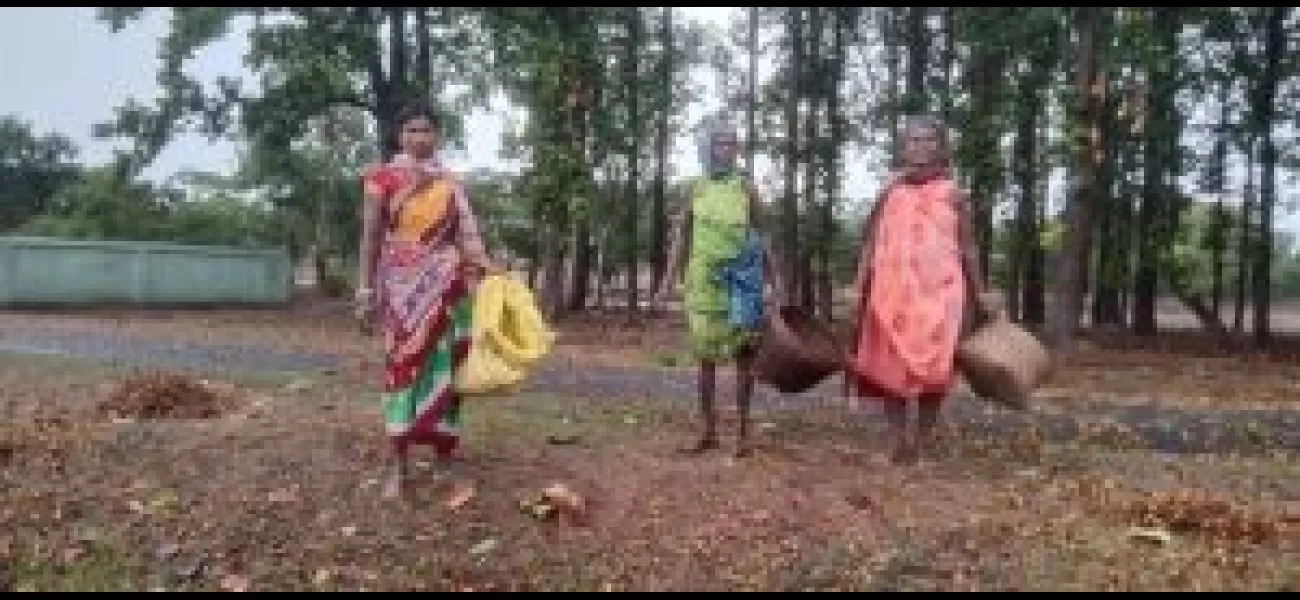Tribal people selling sal seeds at a low price due to financial difficulties, benefiting traders.
"Tribals in Dabugaon, Nabarangpur are selling Sal seeds at lower prices due to lack of knowledge about government-set rates. Traders have control without proper system."
May 21st 2024.

According to a recent report, the tribal community in Dabugaon, located in the Nabarangpur district, is facing a major issue of distress sale of Sal seeds. This is due to their lack of awareness about the state government's fixed prices for minor forest produce. The absence of a proper mechanism has given traders the upper hand in determining the prices, leaving the collectors with no choice but to sell their stock at extremely low prices and struggle to make ends meet.
This trend is prevalent in the tribal-dominated Dabugaon block, where the locals rely on collecting Sal seeds during the summer season to make a living. It is alleged that the collectors face significant losses as they are unaware of the state government's support price for Sal seeds. This is primarily due to the failure of government officials to educate the tribals about the fixed prices and facilitate the sale at fair rates.
Sources reveal that the state government has authorized panchayat samitis to determine the prices of minor forest produce and oversee their sale. However, this order seems to have only remained on paper, as the tribal villagers are completely unaware of the prices set for different produce.
The traders in the haats, or local markets, take advantage of this lack of information and set their own prices for the produce, exploiting the gullible tribals. The negligence of government officials in the panchayats is to be held responsible for this unfortunate situation.
The tribal population heavily depends on collecting 64 varieties of minor forest produce, including Sal seeds and Mohua flowers, to sustain themselves. This is evident in the plight of the collectors in Saraguda village, where men and women work tirelessly from dawn till dusk to collect Sal seeds from the nearby forests. However, they are completely unaware of the government-set prices for their stock. As a result, they are forced to sell their seeds at a much lower price, ranging from Rs.12 to Rs.15 per kg, as dictated by the traders. This has been confirmed by several women from the village, including Buduri Pujari, Sanai Bhatra, Manai Pujari, Kalam Pujari, and many others.
It is worth noting that the state government has fixed the price of Sal seeds at Rs.20 per kg, as mentioned by the Tribal Development Co-operative Corporation of Odisha Ltd. A comparison between the government price and the rates at which the tribals are selling their produce reveals that they are incurring significant losses of Rs.5 to Rs.8 per kg.
In 1967, the TDCC was established by the state government with the aim of ensuring fair prices for tribal products and supporting the primary producers and collectors. However, sources reveal that despite 50% of the forests in the Dabugaon block being covered by Sal trees, only 1 lakh quintal of Sal seeds are collected each year. A senior Forest official, who wished to remain anonymous, also confirmed this.
It has been 20 years since the state government delegated the sale and management of minor forest produce to the panchayats. However, it has been observed that instead of benefiting the collectors, the panchayats only issue licenses to traders. The state government has turned a blind eye to the plight of the collectors and has not taken any necessary actions to improve their situation. However, a senior official has stated that the TDCC is planning to purchase Sal seeds directly from the tribals, and efforts are underway to construct a godown in the district.
When contacted, the panchayat development officer of Dabugaon, Padmanabha Bhalla, mentioned that the prices for minor forest produce are fixed every October, and the price for Sal seeds has been set at Rs.20 per kg. This indicates that the government is taking steps to address the issue, but there is still a long way to go in educating and supporting the tribal community in Dabugaon.
This trend is prevalent in the tribal-dominated Dabugaon block, where the locals rely on collecting Sal seeds during the summer season to make a living. It is alleged that the collectors face significant losses as they are unaware of the state government's support price for Sal seeds. This is primarily due to the failure of government officials to educate the tribals about the fixed prices and facilitate the sale at fair rates.
Sources reveal that the state government has authorized panchayat samitis to determine the prices of minor forest produce and oversee their sale. However, this order seems to have only remained on paper, as the tribal villagers are completely unaware of the prices set for different produce.
The traders in the haats, or local markets, take advantage of this lack of information and set their own prices for the produce, exploiting the gullible tribals. The negligence of government officials in the panchayats is to be held responsible for this unfortunate situation.
The tribal population heavily depends on collecting 64 varieties of minor forest produce, including Sal seeds and Mohua flowers, to sustain themselves. This is evident in the plight of the collectors in Saraguda village, where men and women work tirelessly from dawn till dusk to collect Sal seeds from the nearby forests. However, they are completely unaware of the government-set prices for their stock. As a result, they are forced to sell their seeds at a much lower price, ranging from Rs.12 to Rs.15 per kg, as dictated by the traders. This has been confirmed by several women from the village, including Buduri Pujari, Sanai Bhatra, Manai Pujari, Kalam Pujari, and many others.
It is worth noting that the state government has fixed the price of Sal seeds at Rs.20 per kg, as mentioned by the Tribal Development Co-operative Corporation of Odisha Ltd. A comparison between the government price and the rates at which the tribals are selling their produce reveals that they are incurring significant losses of Rs.5 to Rs.8 per kg.
In 1967, the TDCC was established by the state government with the aim of ensuring fair prices for tribal products and supporting the primary producers and collectors. However, sources reveal that despite 50% of the forests in the Dabugaon block being covered by Sal trees, only 1 lakh quintal of Sal seeds are collected each year. A senior Forest official, who wished to remain anonymous, also confirmed this.
It has been 20 years since the state government delegated the sale and management of minor forest produce to the panchayats. However, it has been observed that instead of benefiting the collectors, the panchayats only issue licenses to traders. The state government has turned a blind eye to the plight of the collectors and has not taken any necessary actions to improve their situation. However, a senior official has stated that the TDCC is planning to purchase Sal seeds directly from the tribals, and efforts are underway to construct a godown in the district.
When contacted, the panchayat development officer of Dabugaon, Padmanabha Bhalla, mentioned that the prices for minor forest produce are fixed every October, and the price for Sal seeds has been set at Rs.20 per kg. This indicates that the government is taking steps to address the issue, but there is still a long way to go in educating and supporting the tribal community in Dabugaon.
[This article has been trending online recently and has been generated with AI. Your feed is customized.]
[Generative AI is experimental.]
0
0
Submit Comment





